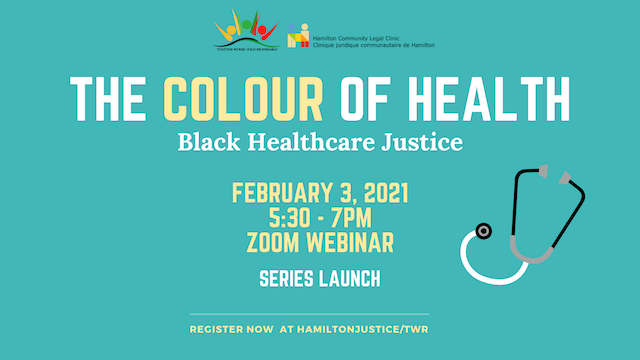
Please see this video recording of our event ” The Colour Of Health – Black Healthcare Justice” which was held on February 3rd, 2021.
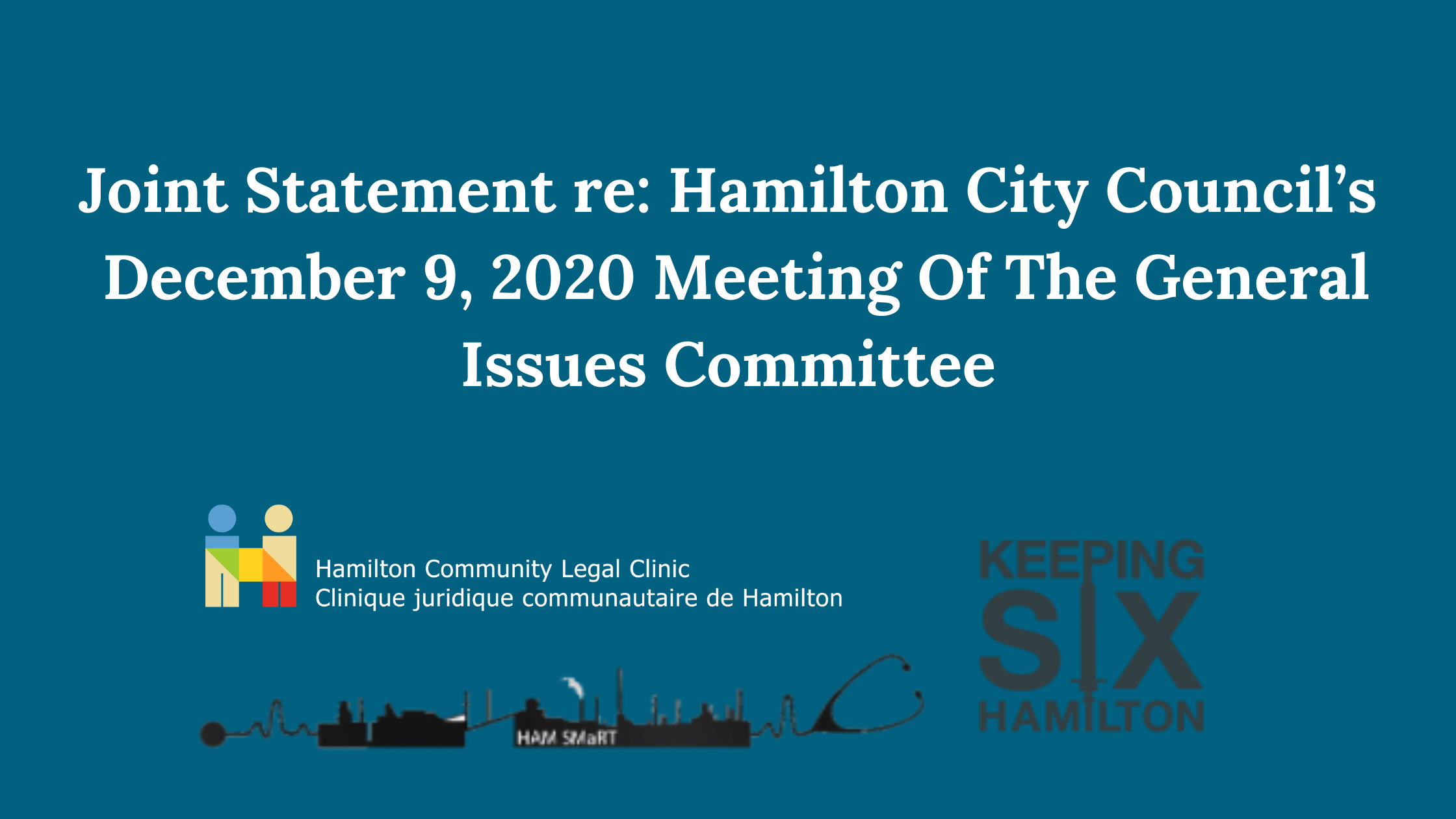
JOINT STATEMENT
The Hamilton Community Legal Clinic (HCLC), Hamilton Social Medicine Response Team (HAMSMaRT) and Keeping Six (K6) issue the following joint statement in response to Hamilton City Council’s December 9, 2020 meeting of the General Issues Committee, wherein an encampment update regarding expenses was on the agenda.
Some City Councillors have alleged that the encampment litigation was nothing more than a “stunt” that was deliberately launched on the Friday before a summer long weekend. We wish to set the record straight on the rationale and timing of the encampment litigation this past summer. For anyone interested in a comprehensive timeline of events, please see keepingsix.org/encampments for an interactive timeline of our interactions with the City on this issue. As previously stated we, along with Wade Poziomka from Ross & McBride, had reached out to the City’s legal counsel and Housing Services staff about our concerns regarding the dismantlement of encampments well before a motion for an injunction was filed. These concerns are well documented elsewhere and we will not reiterate them here.
While the City did agree to listen to our concerns, we had just started meeting with staff and counsel to come to an agreement . Throughout this process, we were insistent about our desire to resolve matters informally and out of court. We were also candid about the fact that, if the City were to plan a further dismantlement, it would force the parties into litigation.
On July 28, 2020, HAMSMaRT and K6 received a call from the Director of Housing Services advising that the encampment on Ferguson would be cleared on July 31, 2020. We sent emails and made calls to Housing Services, the General Manager of Healthy and Safe Communities Paul Johnson, and City Counsel. The leads on this file, Paul Johnson as well as the City’s legal counsel, were both on vacation when the call was made to dismantle the Ferguson encampment. The City staff and legal counsel who did respond were unable to make a written commitment that no one would be forcibly removed against their will. With less than three days to go, we were forced to file for an injunction to stop the dismantlement. On July 30, 2020 a Superior Court judge was satisfied that there was a risk of “irreparable harm” to encampment residents, and the injunction was granted. Of note, the City took no position on the injunction. The injunction was later extended on consent. If the City were interested in really looking at what prompted the injunction, they need look no further than who ordered the dismantlement of Ferguson while we were in talks with City staff as to how to resolve this out of court.
As such, it should be abundantly clear that the decision to file for an injunction before a long weekend was not a “stunt”. There was a long lead up that was full of communication between the parties, and never was the possibility of litigation unclear. The timing and necessity for the injunction was entirely in response to the City’s plan to dismantle the Ferguson encampment.
The injunction was an absolute last resort for us and even after it was granted, we continued to reach out to the City for an informal resolution. These efforts continued until the 11th hour, when the City agreed to enter settlement discussions in mid-September. An agreement was reached shortly thereafter. The vast majority of the legal fees incurred by the City would have been avoided had the City agreed to enter settlement discussions with us immediately after the injunction was granted, as we had proposed.
In the recent GIC meeting, the allegation that a tent drive created artificial homelessness was again raised. These allegations demonstrate a fundamental lack of understanding of the issues that have driven more people to sleep unsheltered across our entire country during this pandemic. City councillors in Hamilton alleging that the increase in people sleeping rough in our city was caused by the very people who work every day to serve these individuals is an embarrassment.
Last week’s GIC meeting also discussed the recent Defund the Police and Invest in Housing protest. A number of councillors are conflating the work of K6/HAMSMaRT and the Hamilton Community Legal Clinic with the Defund HPS organizers. The City of Hamilton has a rich history of political activism and social justice movements. There is not “one party” with “one individual” behind recent events. There are in fact many groups who are both deeply concerned about the housing and homelessness crisis, and committed to effecting change. Further, we take issue with the council’s smearing of the Defund HPS organizers. As an organization that has chosen to work through institutional channels, be it the City bureaucracy or the courts, we respect and deeply recognize the need for a diversity of strategies for achieving change. We believe that ire of those in council should be directed at the injustice, not those raising it for resolution.
In addition to misrepresenting the issues, some councillors have reduced their arguments to the level of personal attacks, namely against Dr. Jill Wiwcharuk, who has worked tirelessly to serve the community for more than a decade. The contorting of the advocacy Dr. Wiwcharuk does in the interest of her patients into “harassment and hijinks” is simply shameful.
This issue of housing is one of the most pressing of our times. It is exhausting and unproductive to repeatedly have to respond to unfounded allegations while we are working daily on the streets with our patients, clients and friends who are dying from the inaction. Currently, all signs point to a worsening not an improvement of the problem. We recognize and have repeatedly acknowledged that the problem of the housing crisis is bigger than anything the City has capacity to resolve on its own. Our simple request from the beginning of the pandemic was to ask the City to refrain from doing harm by further dislocating people who had nowhere else to go.
We are proud that our actions have played a role in achieving some measure of that modest request. There is much work to be done, but there has been a shift in culture with respect to encampments and how to engage with people in ways that don’t do more harm.
But now we need to do more than just do no harm. We need honest, intelligent conversations that trade in facts, and not attacks and deflections of responsibility. We need imagination and ideas that both build and depart from the status quo. Let’s build on City and community partnerships and work together for an inclusive community, actively engaged in making Hamilton a better place for everyone.
Wednesday, December 16, 2020
Dr. Elizabeth Richardson
Medical Officer of Health, City of Hamilton elizabeth.richardson@hamilton.ca
Dear Dr. Richardson,
The purpose of this letter is to draw your attention to your legal authority and responsibility to order the suspension or restriction of enforcement of residential eviction orders – a measure urgently needed to help reduce the spread of COVD-19 and the threat that it poses to health. As our city’s Medical Officer of Health, we demand that you act upon the overwhelming evidence that residential evictions exacerbate homelessness, overcrowding of shelters, circulation between households, and other phenomena that encourage the spread of this virus, as well as the human suffering and death that result from it.
The Superior Court of Justice had suspended residential eviction enforcement in Ontario from mid March until the end of July 2020, but has since concluded that it does not have jurisdiction to reconsider or reverse that decision. The Court has instead held that the question of whether to suspend evictions is a public policy decision for government to make.
Last week, the Ontario Legislative Assembly unanimously adopted a resolution calling for the suspension of residential eviction enforcement in this province until the end of the COVID-19 pandemic. The passage of that resolution came after similar calls by the City of Toronto, the Regional Municipality of Peel and the Toronto Board of Health seeking provincial action on this matter.
However, none of those resolutions are binding on government, and so enforcement of residential evictions continues as though there is no pandemic. In our view, as the government official tasked with preventing the spread of disease and protecting the health of the people of Hamilton, you have the power and responsibility to make the decision to suspend the enforcement of residential evictions during the COVID-19 pandemic. This decision is especially yours to make because it requires the application of public health evidence to temporarily restrict an activity likely to spread a communicable disease.
Section 22 of the (“HPPA”) gives you, as a medical officer of health, the power to make orders that “may require a person to take or to refrain from taking any action that is specified in the order in respect of a communicable disease.” Your order may be directed at one or more classes of persons (e.g., residential landlords seeking to enforce eviction orders, and Court Enforcement Officers or the “Sheriff”), and may be binding on other branches of government.
In September, the U.S. Centres for Disease Control and Prevention (CDC) declared
residential evictions of tenants “detrimental to public health control measures to slow the
spread” of COVID-19 and instituted a nation-wide partial moratorium. The CDC were acting on evidence that enforcement of residential eviction orders not only causes persons to circulate within outdoor encampments, shelter spaces, public transit, and acute health care settings – but even in the best-case scenario, such evictions cause entire households to move into other households, increasing contact between persons of varying ages, health conditions, and activity levels within the community.
As the weather turns colder and the second wave of COVID-19 continues, all of these ordinary consequences of residential eviction pose an added health risk not only to low- income and racialized communities most evicted, but to their families, friends, and ultimately the public at large. Tenants facing eviction may end up as patients in a hospital emergency room or long-term care facility; some of them already work as front- line staff in those facilities or in our factories, kitchens, grocery and hardware stores.
All our political leaders seem to agree that something should be done. The CDC took this action months ago. It is time for you to act.
Sincerely,
Hamilton Community Legal Clinic
CC: Hamilton Public Health (publichealth@hamilton.ca)
Ali Naraghi – Staff Lawyer
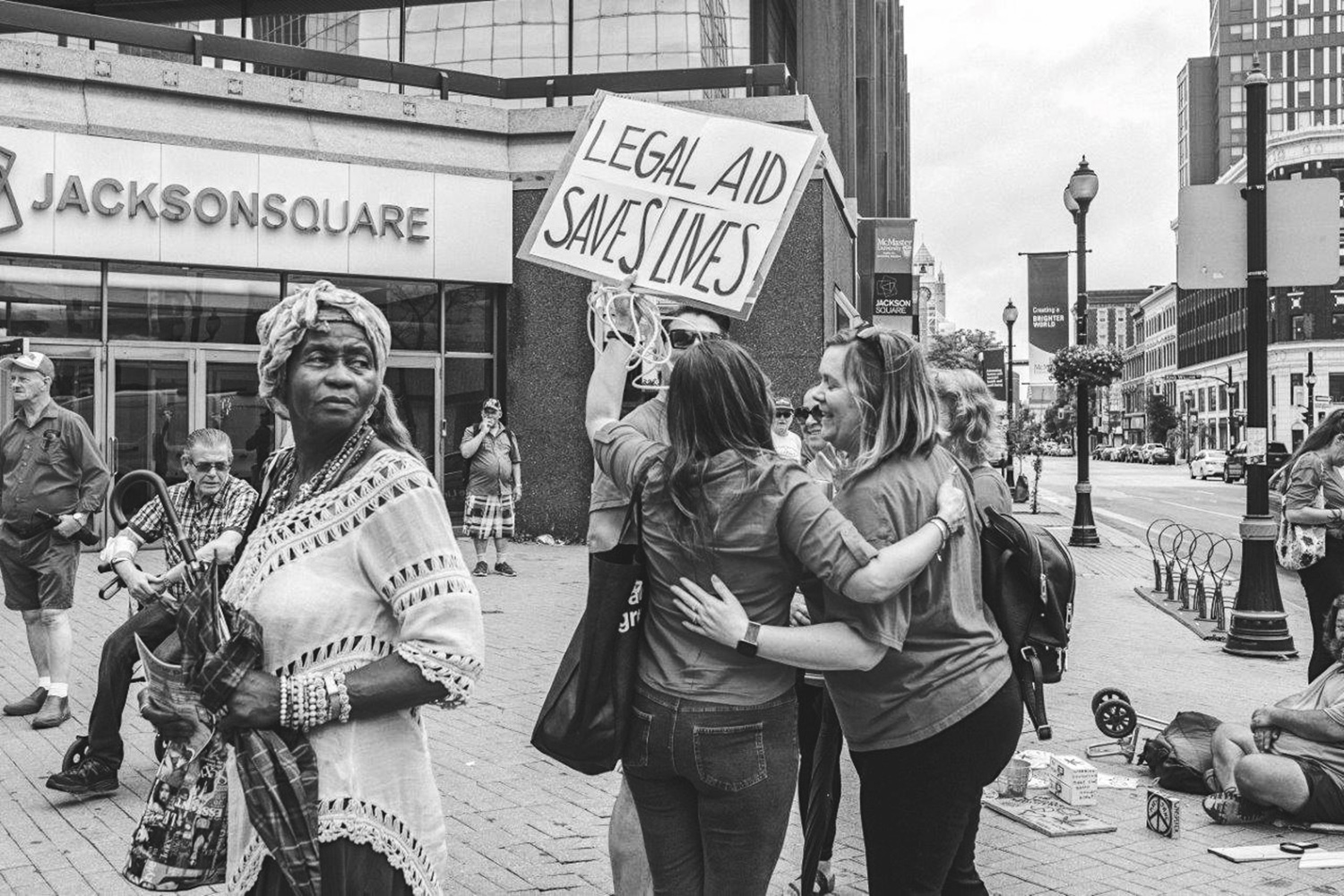
December 8, 2020
The Honourable Doug Downey Attorney General of Ontario McMurtry-Scott Building, 11th Floor 720 Bay St
Toronto, ON M7A 2S9
The Honourable Todd Smith
Minister of Children, Community & Social Services
7th Floor, 438 University Ave. Toronto, ON M5 G 2K8
Sent via email: Doug.downey@pc.ola.org, Todd.Smithco@pc.ola.org
Dear Attorney General Downey and Minister Smith,
RE: ALARMED FOR THE FUTURE OF THE SOCIAL BENEFITS TRIBUNAL AND APPEALS PROCESS
We are writing on behalf of the Steering Committee for Social Assistance, the community legal clinics’ working group made up of representatives from across the Province with the participation of specialty clinics including the Income Security Advocacy Centre (ISAC) and Community Legal Education Ontario (CLEO) as well as the Clinic Resource Office (CRO). The Steering Committee seeks opportunities to improve social assistance policies and procedures through ongoing communication with government, the community legal clinics, and other affected groups.
Governments, through the Ontario Disability Support Program and Ontario Works, have sought to support Ontarians with disabilities and others who would otherwise live in poverty. Understandably, the application and appeal process are constantly under scrutiny. However, we are concerned that the Social Benefits Tribunal is being severely curtailed, and we are alarmed by signals that it may be in the process of being eliminated.
Legal clinics are reporting that some of their clients will have to wait until 2022 to get their appeals heard. We believe that the delays are in part due to the shortage in the number of current adjudicators at the Tribunal. Having people who live in deep poverty wait for over a year to get benefits causes undue hardship, which is now felt even more given the Covid-19 Pandemic. We support a Social Benefits Tribunal that is resourced with an appropriate number of adjudicators, so that appeals can be heard in a timely way. We urge you to take action to address this important access to justice issue.
The right to an appeal process at the Tribunal is enshrined in legislation, and it is a vital one that needs to be preserved. Even in the best of application systems, it is only fair and reasonable to apply a check on the decision-making of Ministry staff. We call on the provincial government to publicly declare that it will preserve the important independent role of the Social Benefits Tribunal in ensuring that no one is wrongly denied the benefits they need for their survival.
Sincerely, Laura Hunter
Michael OIlier
Co-Chairs of the Steering Committee on Social Assistance
Cc. Sent via email to:
Gurratan Singh, Critic, Attorney General, New Democratic Party. GSingh-QP@ndp.on.ca Lisa Gretzky, Critic, Community and Social Services, New Democratic Party LGretzky- QP@ndp.on.ca Lucille Collard, Critic, Attorney General, Liberal Party. LCollard.mpp.co@liberal.ola.org Michael Coteau, Critic, Community and Social Services, Liberal Party.Mcoteau.mpp.co@liberal.ola.orgMike Schreiner, Leader, Green Party. Mschreiner-co@ola.org Sean Weir, Executive Chair, Tribunals Ontario. Sean.Weir@ontario.ca Stacey Ferguson, Associate Chair, SBT.Stacey.Ferguson@ontario.ca Sharon Buchanan, Counsel, Tribunals Ontario. Sharon.buchanan@ontario.ca
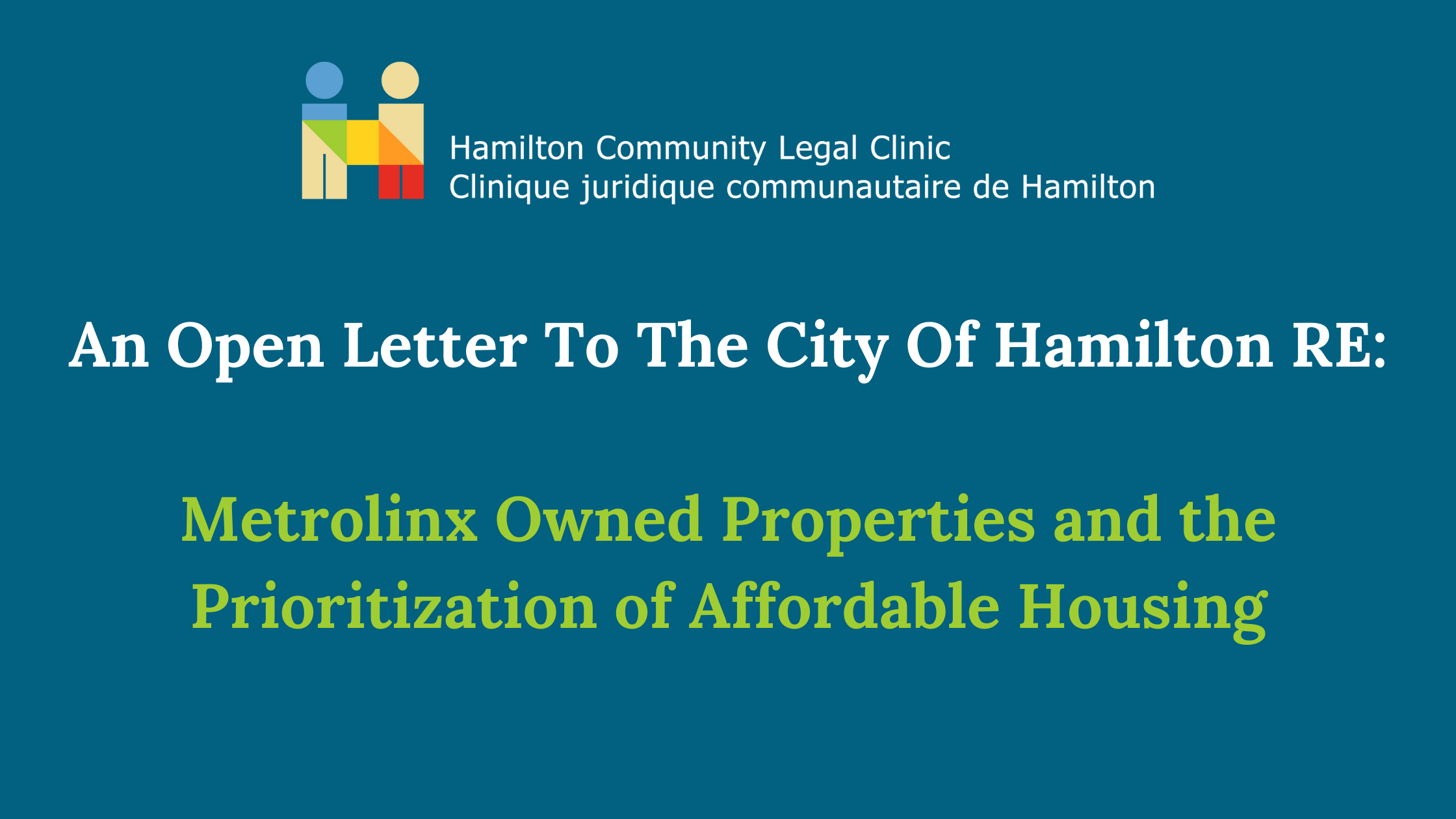
“As you know, the Hamilton Community Legal Clinic provides services to the most marginalized members of the Hamilton community as we advance legal rights within a context of intersecting social issues to ensure individuals’ basic needs are met.
Our role offers us a concrete window of exposure to the implications of the housing crisis facing the country, province and our locality. Reoccurring concerns are both immediate and long term: the first being the urgency of the immediate need for adequate affordable housing and the future concern of how policies today fuel or ameliorate the future housing stock. We are alarmed about the fate of the Metrolinx owned properties. We call on the City to leverage this opportunity to guarantee that these properties be utilized for affordable housing”
For the complete letter, read the PDF below:
Nov 19 20 Ltr to City re Metrolinx housing
For some more statistics on why we should invest in housing, read the PDF below:

On April 1st, 2010, the Hamilton Community Legal Clinic first began its operations after amalgamating three longtime legal clinics. We are proud to say that it has been 10 years since we began serving Hamilton as one, unified clinic.
Please see our 2020 Annual Report to learn more about the work that we have been doing for the past 10 years.
HCLC 2020 Annual Report – English
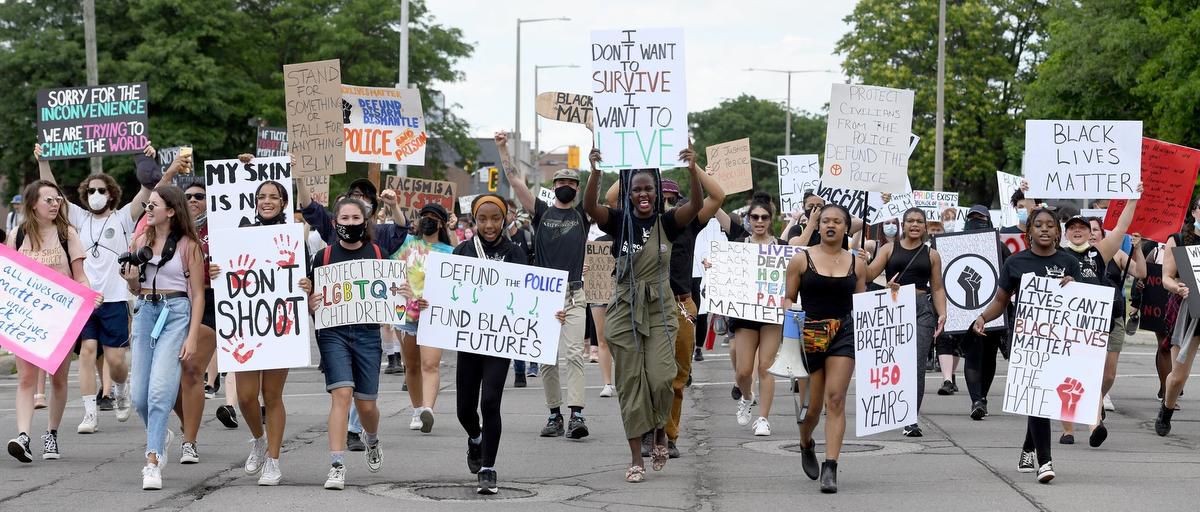
Transformation of the Criminal Justice System:
A Call for a Societal Anti-Racism Anti-Oppression Framework
A white police officer’s knee on the neck of an immobilized Black man is a powerful analogy for the State’s violent repression of some of its citizenry. Incidents of police violence caught on video are driving demands for transformative, societal change here in Hamilton, across Canada and around the world. We join that call as we share the pain and righteous rage communities are experiencing in response to this abuse. Canada was founded on racial injustice yet has a long history of denying that racism proliferates in this country. Finally, systemic racism has been acknowledged by government and institutional leaders and a broad coalition of people and organizations is demanding the dismantling of structural inequities. We join others in calling for the implementation of an anti-racism, anti-oppression framework as the foundation for this social change.
Community legal clinics have been working with low income individuals and communities in Hamilton for over forty years. It is our experience, and we know from evidence, that poverty marginalizes people in all aspects of their lives and is a key social determinant of health and inclusion. We also know that people experiencing poverty are disproportionately Indigenous, Black, racialized, female-identifying, people with disabilities including mental health, members of the 2S and LGBTQIAPGNC communities and newcomers.
As a mainstream, government-funded agency, we have been taking a critical look at how we contribute to the perpetuation of colonization and systemic racism and oppression. It is an uncomfortable and unsettling process, one that requires honesty, education, listening, self-reflection and empathy. It requires a deep understanding of the history and current reality of white supremacy and how privilege influences people’s outcomes positively and negatively. It is also inspiring and motivating. We have embarked on a journey to develop and implement a robust Anti-Racism, Anti-Oppression (ARAO) Plan. It is a framework for all decision-making, service delivery, community engagement, policy development and human resources, as well as all personal interactions.
This same ARAO lens must be the approach to transform the criminal justice system. It would influence every decision necessary to design laws, procedure, structures, institutions and processes, including governance, oversight and accountability measures. It would centre diverse people as the architects of change and amplify the voices of those who have been historically disempowered and silenced. It would recognize that the police are only one part of a larger state funded and operated system that must be wholly re-envisioned.
Hamilton Community Legal Clinic supports transformational change of the criminal justice system including investing in decriminalization, disarmament, demilitarization and alternatives to policing. We support the reallocation of resources to community-centred supports, including health, housing, education, youth, social development and programs that improve quality of life and community wellbeing.
We join the call for structural change, as opposed to incremental tweaks. We provide the following as examples of essential reforms. This list is not exhaustive, but illustrates a holistic, ARAO approach to meaningful, transformative change:
The time for change is now. And it must be transformative .